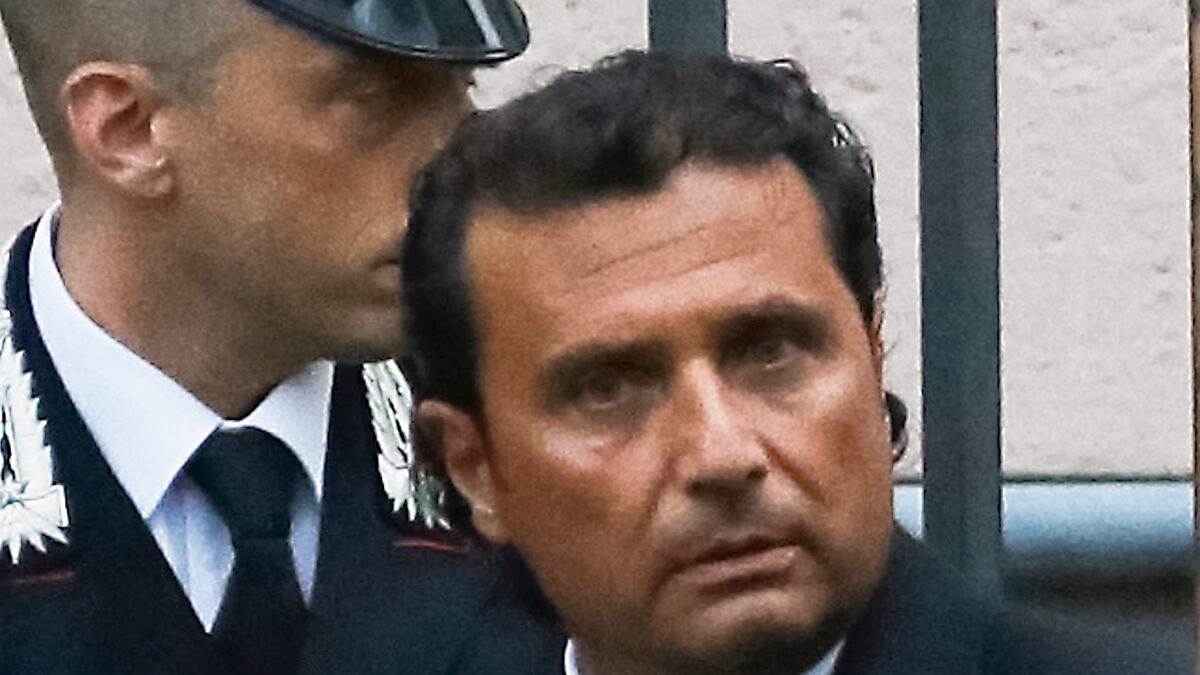Francesco Schettino, the erstwhile captain of the Costa Concordia—the ill-fated cruise ship that still lies in a heap off the Tuscan island of Giglio—faced his accusers and a handful of passengers in a closed-door preliminary hearing in Grosseto, Italy, on Monday. Schettino was the captain of the Costa Concordia when it crashed into an outcropping off Giglio last Jan. 13. Thirty-two people died.
Schettino and eight others are facing possible charges of multiple manslaughter, causing a shipwreck, and not reporting the accident to authorities. Among those under criminal investigation are three members of the Costa Crociere cruise line’s crisis center team with whom Schettino exchanged a number of telephone calls immediately after the crash. The audio recorder on the ship’s black box captured Schettino’s end of the conversation, but investigators are very interested in knowing what the crisis team told him in return. If they asked him to lie to the port authority about the gravity of the situation, or if they in any way directed him to wait to call abandon ship, they could supersede Schettino in being held ultimately responsible for the loss of life. Schettino also faces charges for abandoning ship when he apparently fell into a lifeboat the night of the crash while hundreds of passengers were still trying to get off the sinking vessel.

The former captain, who was officially fired last summer, was not allowed to address the court, but his lawyers filed several motions on his behalf, including calling to court Jacob Rusli Bin, the Indonesian helmsman who was steering the ship on Schettino’s orders the night of the mishap. Audio from the black box, which was distributed on Monday by Italian consumer advocate group Codacons, reveals the moments of chaos on the bridge before the accident. Schettino can be heard bragging, “I love to do the fly-by near Giglio,” as he turned off the ship’s automatic steering to manually guide the cruiser. Moments later, he can be heard yelling “Hard to Port” at the helmsman when it became clear the ship was heading for disaster. The helmsman, who did not speak English or Italian fluently, responded, “Hard to Starboard?” in English. Schettino repeated the request to turn the ship to port, but the delay proved fatal. The judge in the preliminary hearing, Valeria Montesarchio, denied the request to subpoena the helmsman.
Outside the court, lawyers for passengers and crew vied for the attention of a very willing press corps to help maintain the case against Schettino in the court of public opinion. But Schettino had at least one supporter speaking out in his defense. Retired sea captain Fredrik J. van Wijnen, a representative of the Confederation of European Shipmasters’ Associations, told The Daily Beast that Schettino was actually a hero. “What he did once he realized the grave error was heroic,” he said. “His navigational skill coupled with help from the seas and the direction of the wind that night saved over 4,000 lives.”
The closed-door preliminary hearing will continue throughout the week. Evidence presented to the judge will help her determine whether or not to formally charge Schettino and the others, but she does not have to officially charge them with any crimes until Jan. 14—one year after Schettino was arrested. She can also ask for more analysis of the black-box data, and she can call for more people to face charges.
There seems little doubt that Schettino’s well-documented mistakes caused the Costa Concordia to go down, but it is becoming more apparent that his actions alone may not have directly caused the loss of life. He waited more than an hour from the moment the giant ship hit the rocks off Giglio to abandon the ship. He called his company’s crisis line almost 10 times during that hour. No passengers died on impact. The 32 deaths were from the failed evacuation, including the two people whose bodies are still pinned between the ship and the rocks it rested on. Schettino may have made the first mistake, but what investigators want to know is whether anyone helped him make that second fatal error.






